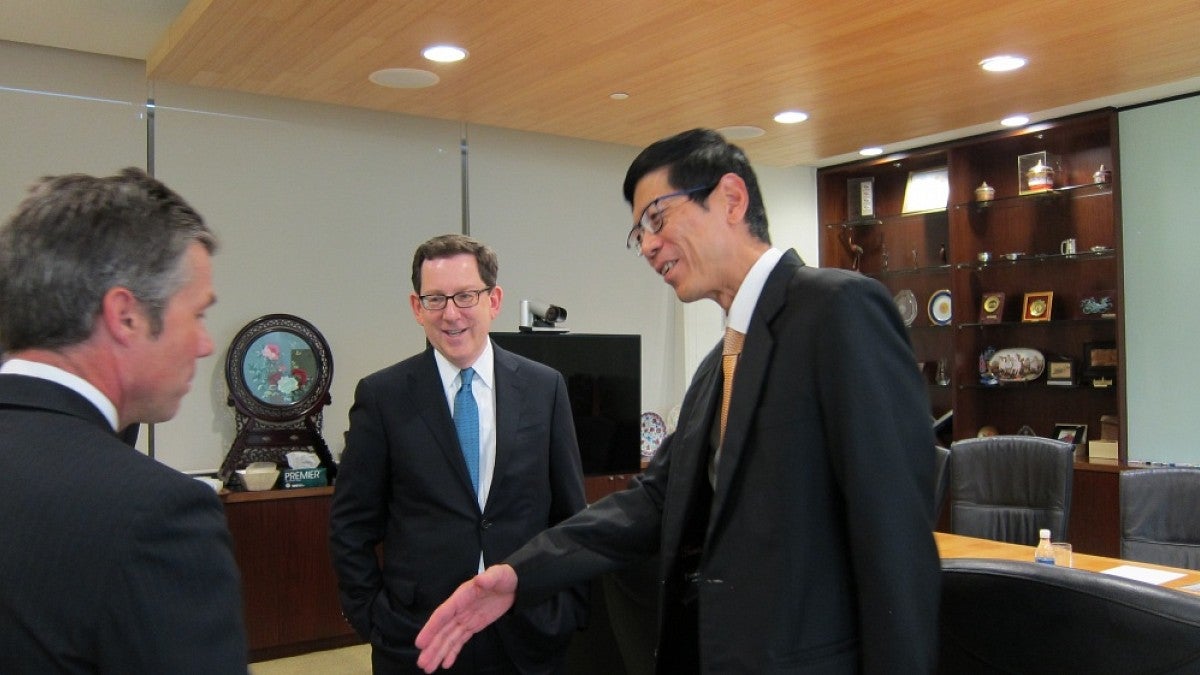With more than 3,250 students from Asia and 22 exchange agreements, it is easy to see why the region is essential to the University of Oregon. So it makes perfect sense that Michael Schill’s first international journey as president has taken him on a 10-day barnstorming trip across the region.
Schill, along with a delegation of university leaders, is currently visiting China, Hong Kong, South Korea, Singapore and Malaysia through July 1. He is hosting meetings with Asian university leaders, prospective students, alumni and other friends of the UO, while also participating in the 2016 Association of Pacific Rim Universities Annual Presidents Meeting in Kuala Lumpur.
“The UO’s global connections to students, donors, alumni and other scholars in Asia is essential to our success as a research university,” Schill said. “It is so exciting to meet with our many enthusiastic supporters all across Asia and to strengthen these relationships and collaborations. Our students and faculty benefit immensely from these global exchanges and experiences that we are cementing while here.”
Schill was joined by Dennis Galvan, vice provost for international affairs; Mike Andreasen, vice president for university advancement; John Manotti, associate vice president for international advancement; Abe Schafermeyer, director of international student and scholar services; and Kimberly Johnson, director of academic advising.
“We’ve built research partnerships and student opportunities across the region, in every city the president has visited,” Galvan said. “ In every location, alumni, friends, students and their families are excited to meet the new president and eager to hear him describe how global engagement boosts research excellence, widens student access and helps ensure student success.”
Since their arrival, the group has held receptions for incoming students, parents, alumni and donors in Beijing, Hong Kong and Singapore. A team travelling in parallel to the president has also held orientations for new students and their families in Guangzhou and Shanghai, China.
During the trip, Schill joined delegates from 17 countries and 45 research-led universities as part of the 20th Annual Association of Pacific Rim Universities Annual Presidents Meeting in Kuala Lumpur, Malaysia, for discussions on knowledge creation, the economic growth of Southeast Asia, the potential impacts on Pacific Rim higher education of the British exit from the European Union — known as Brexit — and the future of humanities and social sciences in the Asia-Pacific region.
While in Beijing, the team met with officials at one of China’s top research institutions, Tsinghua University, to finalize their participation in a new, UO-led research collaboration on sustainable cities and landscapes. The new partnership builds on the UO’s Sustainable Cities Initiative and top-ranked landscape architecture department to tackle challenges of urbanization around the Pacific Rim. Four Pacific Rim universities join the UO in running the program, including Tsinghua, the National University of Singapore, Taiwan University, the University of New South Wales in Australia and the University of Washington,
Schill also met with the president of the National University of Singapore, Asia’s top-ranked university, to deepen exchange and research ties, especially in areas of mutual strength in the natural and physical sciences.
He held talks with a member of the State Council of the Chinese government, Madam Xu Lin, to discuss the successful history and future prospects of UO’s Confucius Institute, launched seven years ago by UO faculty to focus on China’s global emergence and its impact on culture, the economy and the environment.
Schill will wrap up his tour of Asia with a visit to Seoul, South Korea.


